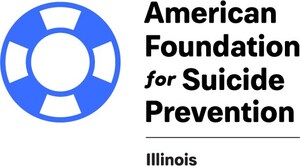NEW YORK, Nov. 20, 2019 /PRNewswire/ -- According to the U.S. Department of Justice, suicide is the leading cause of death in jails, and the suicide rate in prisons continues to increase. The National Commission on Correctional Health Care (NCCHC) and the American Foundation for Suicide Prevention (AFSP) have created an authoritative resource on preventing suicide in correctional facilities, the Suicide Prevention Resource Guide. This guide is free and available to the public.
Drawing from both organizations' expertise, with input from national experts in the field of correctional mental health and suicide prevention, this guide provides a road map, tools and resources for navigating the complexities of suicide prevention within correctional facilities – a serious problem in the United States.
"Research tells us that people in times of transition are at especially high risk for suicide, and incarcerated people are particularly vulnerable due to health and situational reasons," said Robert Gebbia, CEO of AFSP.
The nation's largest suicide prevention organization, AFSP, joined NCCHC's ongoing efforts to reduce suicide among incarcerated populations as part of its Project 2025, which aims to reduce the annual suicide rate 20 percent by 2025. AFSP identified the correctional system as one of four critical areas where evidence points to saving the most lives in the shortest amount of time.
The Suicide Prevention Resource Guide focuses on three key areas, with the goal to educate people who work in jails and prisons on how to better identify and help inmates at risk for suicide, safely manage those identified as high risk, and provide consistent, comprehensive training to all involved personnel.
The Guide includes suicide risk assessment principles, approaches to intervention and treatment, a training curriculum guide, real-life case studies, and facility design considerations.
"We greatly appreciate the teamwork that went into the publication of this guide, and we are especially grateful to AFSP for their guidance, subject matter expertise, and support," said Deborah Ross, CCHP, chief executive officer, NCCHC.
Risk assessment, treatment, and training were identified as essential elements to effective suicide prevention by a group of experts who gathered to brainstorm at a series of summits cosponsored by NCCHC and AFSP over the past two years. The group included mental health experts from the nation's largest jail and prison health care providers, thought leaders from jails, departments of corrections, universities, the federal government, and leaders from NCCHC and AFSP.
"The collaboration between our organizations and national health care providers underscores the importance of working together to tackle the problem of suicide," said Brent Gibson, MD, MPH, CCHP-P, chief health officer, NCCHC. "It represents a true 'meeting of the minds' with the potential to save lives."
The Guide is available at ncchc.org/suicide-prevention-plan.
MORE ABOUT PROJECT 2025
Launched in October 2015, Project 2025 is a high-impact, collaborative initiative developed by AFSP, aimed at achieving the organization's bold goal of reducing the annual suicide rate 20 percent by 2025. Using a dynamic systems model approach based on what the evidence tells us about suicide, AFSP has determined a series of actions and critical areas to help us reach our goal. With this approach we reach across all demographic and sociological groups to have the greatest impact for suicide prevention and the potential to save thousands of lives within the next 10 years. If we work collectively to expand the above interventions in key areas (Firearms, Emergency Departments, Healthcare Systems, and the Corrections System) – cumulatively, we can expect to save nearly 20,000 lives through 2025.
ABOUT THE NATIONAL COMMISSION ON CORRECTIONAL HEALTH CARE
The National Commission on Correctional Health Care is a nonprofit 501(c)(3) organization working to improve the quality of care in the nation's jails, prisons, and juvenile detention and confinement facilities. NCCHC establishes standards for health services in correctional facilities, operates a voluntary accreditation program for institutions that meet these standards, produces and disseminates resource publications, offers a quality review program, conducts educational trainings and conferences, and offers a certification program for correctional health professionals. NCCHC is supported by the major national organizations representing the fields of health, mental health, law, and corrections. Each of these organizations has named a liaison to the NCCHC board of directors. For more information, go to ncchc.org.
ABOUT THE AMERICAN FOUNDATION FOR SUICIDE PREVENTION:
The American Foundation for Suicide Prevention is dedicated to saving lives and bringing hope to those affected by suicide. AFSP creates a culture that's smart about mental health through education and community programs, develops suicide prevention through research and advocacy, and provides support for those affected by suicide. Led by CEO Robert Gebbia and headquartered in New York, and with a public policy office in Washington, DC, AFSP has local chapters in all 50 states with programs and events nationwide. Learn more about AFSP in its latest Annual Report, and join the conversation on suicide prevention by following AFSP on Facebook, Twitter, Instagram, and YouTube.
SOURCE American Foundation for Suicide Prevention

Related Links
WANT YOUR COMPANY'S NEWS FEATURED ON PRNEWSWIRE.COM?
Newsrooms &
Influencers
Digital Media
Outlets
Journalists
Opted In





Share this article